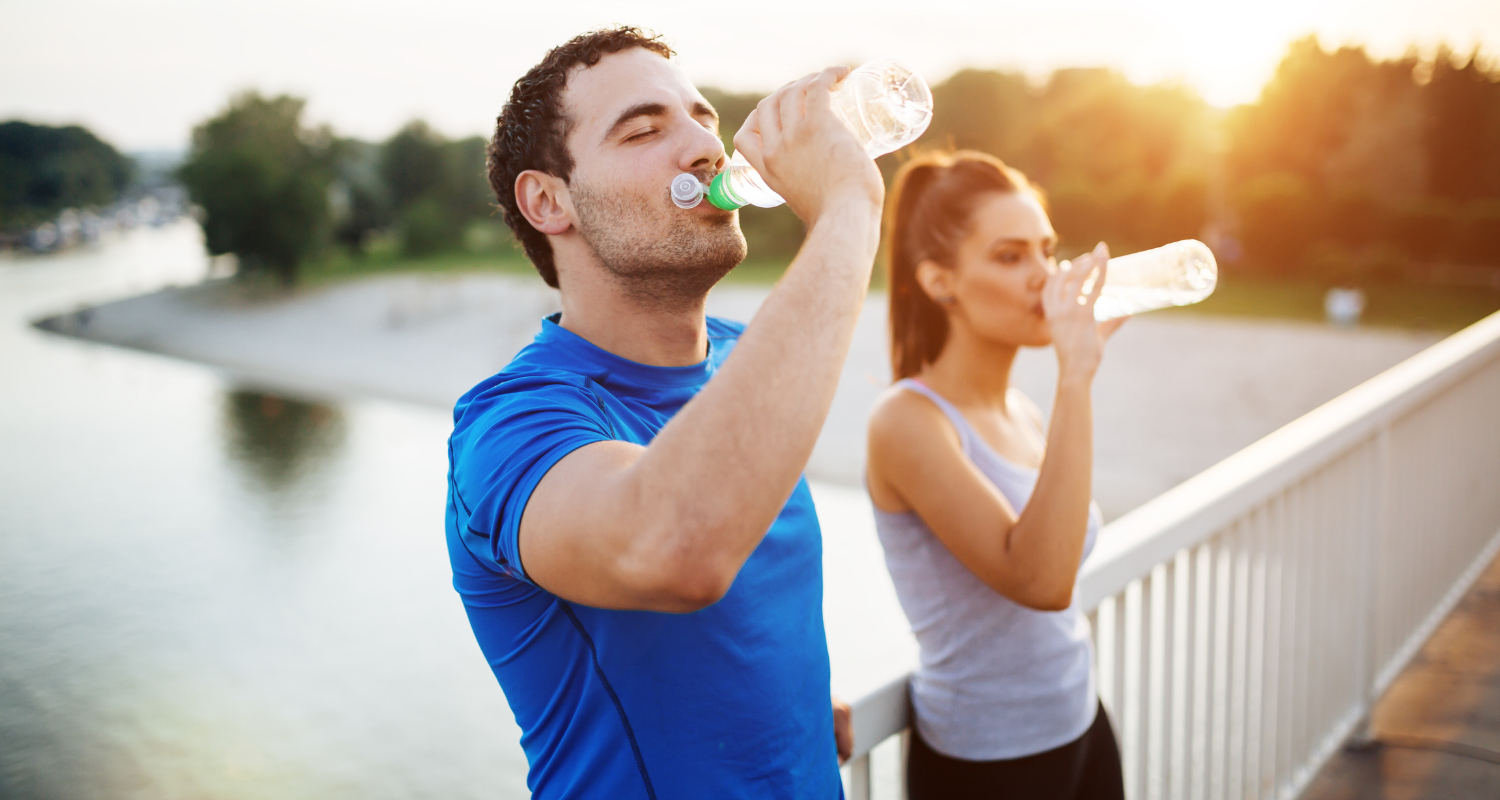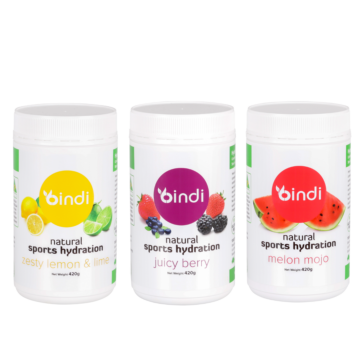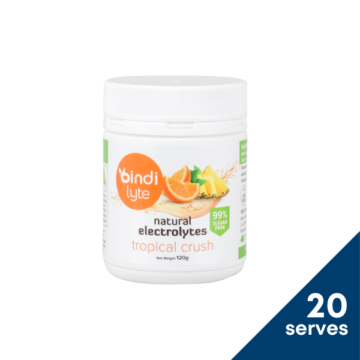Water – it really is life’s liquid gold. Many of us already know that dehydration has a negative impact on physical performance. But studies are also showing us that dehydration can also affect your mood and brain function. Basically, even mild dehydration can lead to lowered mood, increased fatigue and a decline in your ability to think clearly. It doesn’t matter if you are exercising or simply sitting at your desk – the negative impacts of dehydration are the same. Given that the human body is made up of 60% water, the daily consumption of water is essential for our survival.
“Staying properly hydrated is just as important for those who work all day at a computer, as it is for marathon runners”
What role does water play in athletic performance?
It is well known that even mild dehydration of up to 2% body weight can compromise the physical performance of athletes. This occurs because:
- Water helps to regulate your body temperature: Your ability to tolerate heat strain becomes impaired when you are dehydrated, and you will start to experience central fatigue much earlier (i.e., at around core temperatures close to 39 degrees). You will also see a larger rise in your body’s core temperature when exercising in a dehydrated state.
- Water helps to regulate your blood pressure: Dehydration causes a fall in blood volume both at rest and during exercise, which limits your cardiac output and reduces blood flow to your skin and active muscles.
- Water helps to transport nutrients throughout your body: When you are dehydrated, essential macronutrients (carbohydrates, protein, fats and nutrients that support energy transfer) are not properly transported in the body. In addition, metabolic waste from the energy burned during more intense exercise is not adequately removed from your body. This has a negatively impacts your performance and recovery.
is water enough?
Just like water, we need electrolytes. But what are they, exactly? And how do they help us in a way that plain old H2O can’t? Every cell in our body needs electrolytes for proper function. They play an especially important role when it comes to muscle and nerve function, as well as heart health. These minerals carry electrical charges and enable your cells to communicate with one another. We lose electrolytes through sweat, urine, or stool (if you have diarrhea). If you don’t replenish them with food or supplements (or by drinking sports drinks), your body will take from its stores of sodium, potassium, magnesium and calcium to keep things running smoothly.
Calculating your individual sweat loss:
Calculating your individual ‘sweat loss’ allows you to know how much you should be drinking to achieve better fluid replacement in your exercise sessions.
As a general rule of thumb, each kilogram of weight lost is equivalent to approximately one litre of fluid. So, if you finish an exercise session 1 kg lighter and have consumed 1 litre of fluid during the session, then you have a total fluid loss of 2 litres.
A useful sign of adequate hydration is the colour of your urine – aim for a pale-yellow, straw colour.
If you are keen to get a more accurate picture of your sweat loss, consult a sports dietitian who can do sweat testing to calculate your sweat rate in range of environmental conditions and design an individual hydration plan for you.
WHEN DO YOU NEED hydration?
- Pre-workout: Start your exercise hydrated. Drink regularly throughout the day leading up to competition. Consume 200-600 ml of fluid immediately before commencing exercise.
- During workout: Start drinking early in exercise session. Drink small volumes regularly.
- Post-workout: Drink after exercise, as you will continue to lose fluid through sweat and urine.
Hydration in winter, cold climates and the swimming pool:
So it’s winter, and you don’t need to drink so much right? Your body’s water requirements are generally less when exercising in colder climates and this is partly due to the fact that exercising in the cold reduces sweat loss (your body’s way to avoid hypothermia). However, this does not mean that there is a decreased risk for dehydration. Insulated clothing traps any heat loss that is escaping through the skin, which will increase your sweat rate and require you to replace lost fluids.
You may not actually realise how much you are sweating under your insulated clothing, and therefore not be aware of the extent of your fluid loss.
Add to this plenty of heating and drier air, indoor training, heated swimming pools etc and it is very easy to be mildly and chronically dehydrated in winter.
What to drink, when…
If you are exercising for more than an hour and at high intensity, then a Bindi Natural Sports Hydration with 4-8% carbohydrate is well proven to improve fluid intake and your performance.
Alternatively, for short or less intense sessions, use a Sugar Free electrolyte such as Bindilyte which contains electrolytes but no carbs – this will be ideal to hydrate you both during and after your session.
If you are feeling tired, with a low mood, or you’re not losing weight, training or recovering well…have a close look at your fluid intake and chances are improving your hydration on a daily basis will make a big difference to your performance and overall wellbeing.
winter hydration products:
References
- Armstrong L et al., 2012. Mild dehydration affects mood in healthy young women. The Journal of Nutrition. oi: 10.3945/jn.111.142000. Accessed August 2017 at: http://jn.nutrition.org/content/early/2011/12/20/jn.111.142000.full.pdf+html
- Ganio et al. 2011. Mild dehydration impairs cognitive performance and mood of men. British Journal of Nutrition, 106(10): 1535-1543. Accessed August 2017 at: https://www.cambridge.org/core/journals/british-journal-of-nutrition/article/mild-dehydration-impairs-cognitive-performance-and-mood-of-men/3388AB36B8DF73E844C9AD19271A75BF
- Hazell K, 2012. Mild dehydration causes anger, fatigue and mood swings, study reveals. Huffington Post 20/02/2012. Accessed August 2017 at: http://www.huffingtonpost.co.uk/2012/02/20/mild-dehydration-causes-a_n_1288964.html
- American Council on Exercise (ACE). How hydration affects performance. Accessed August 2017 at: https://www.acefitness.org/blog/5397/how-hydration-affects-performance
- Australian Institute of Sport (AIS) Sports Nutrition, 2009. Fluid – Who needs it? Accessed August 2017 at: https://www.ausport.gov.au/ais/sports_nutrition/fact_sheets/fluid_-_who_needs_it
- Sports Dietitians Australia (SDA). Fluids in sport (factsheet). Accessed August 2017 at: https://www.sportsdietitians.com.au/factsheets/fuelling-recovery/fluids-in-sport/
- Schuft M, Jenkins D, 2014. Fluid and electrolyte balance during winter sports. Access August 2017 at: https://cehsp.d.umn.edu/sites/cehsp.d.umn.edu/files/fluidandelectrolytebalanceduringwintersports1.pdf
- Jeukendrup A, Gleeson M, 2010. Dehydration and its effects on performance. Excerpt from: Sport Nutrition: An introduction to energy production and performance (2nd). Human Kinetics. Accessed July 2017 at: http://ow.ly/Tnqe30dR1nF


